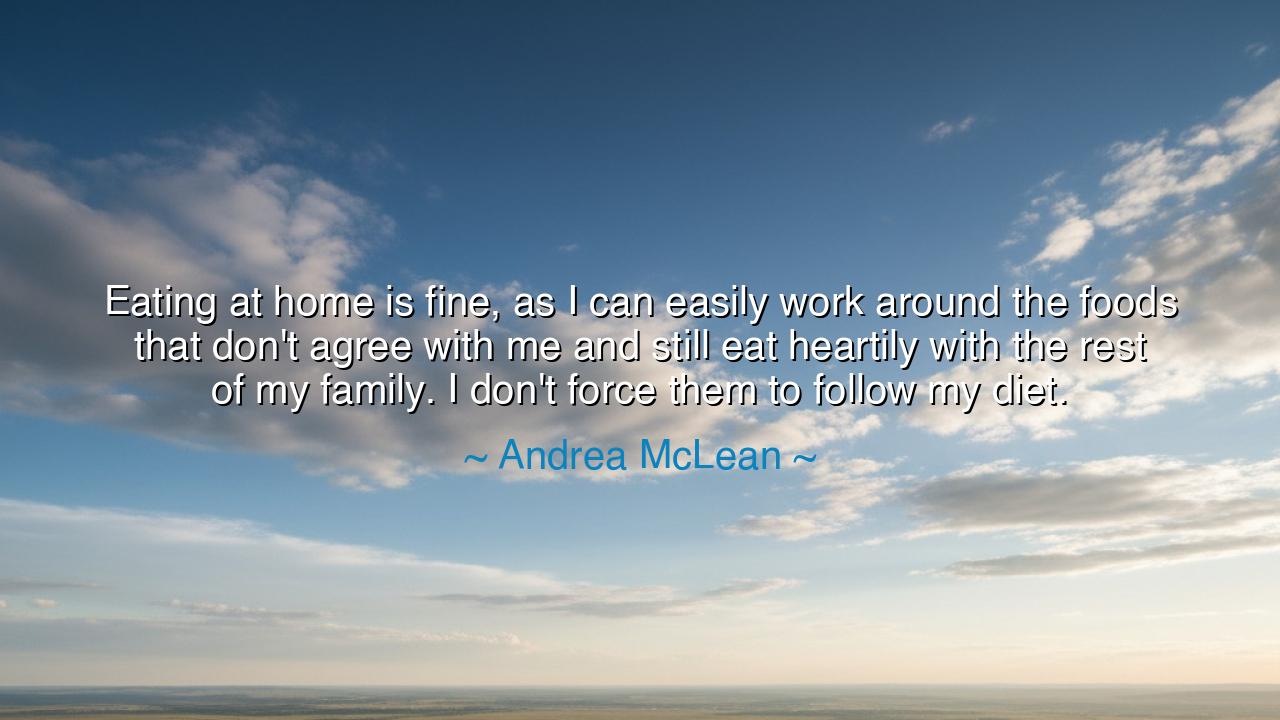
Eating at home is fine, as I can easily work around the foods
Eating at home is fine, as I can easily work around the foods that don't agree with me and still eat heartily with the rest of my family. I don't force them to follow my diet.






In the words of Andrea McLean, there breathes a quiet wisdom—one not born of theory, but of compassion and experience: “Eating at home is fine, as I can easily work around the foods that don’t agree with me and still eat heartily with the rest of my family. I don’t force them to follow my diet.” Simple though her words may seem, they conceal within them a truth of great depth—the truth of balance, of acceptance, and of harmony within difference. Hers is not merely a statement about food, but about the art of living peacefully alongside others, even when one’s own path must differ.
To eat at home is to share in one of the oldest rituals of humanity. Since the first fire was lit in the darkness of prehistory, the meal has bound people together as family, tribe, and civilization. It is around the table that love is expressed not in words, but in offerings—the breaking of bread, the sharing of warmth. Yet McLean’s words remind us that even within this sacred circle of belonging, there must be room for individuality. She acknowledges her body’s limits, her need for certain foods, yet she refuses to let this necessity divide her from those she loves. In this, she embodies the wisdom of the ancients: that harmony is not sameness, and that unity is made stronger by the grace to honor difference.
Her statement is also an act of humility. She does not demand that her family bend to her will, nor insist that her way is the only way. In an age where conviction often hardens into dogma, McLean shows the nobler strength—the strength of gentleness. To live by one’s principles without imposing them is a mark of true wisdom. The Stoic philosophers taught that virtue lies in self-mastery, not in the domination of others. “Control thyself, not the world,” said Epictetus, for to command others without first commanding one’s own passions is folly. So too does McLean quietly practice this ancient discipline: she chooses her own path, yet walks beside others with love.
There is, too, a deeper symbolism in her words. The meal has always been a metaphor for life itself. Each person must choose what nourishes them, what their spirit and body can truly digest. For one, it may be meditation; for another, labor; for another still, laughter and family. Yet when we sit together, we must remember that not all may eat of the same dish. The wise soul learns to partake of the feast of life without judgment, respecting that others may draw strength from sources we cannot. McLean’s refusal to force her diet upon her family is thus an emblem of a greater truth: that peace is found not in uniformity, but in mutual respect.
Consider the story of the Buddha, who, after years of extreme asceticism, realized that starvation of the body could not lead to enlightenment of the spirit. Accepting a bowl of rice from a humble village girl, he broke his long fast and embraced what he would later call the Middle Way—a life neither of indulgence nor of denial. In that simple act of eating, he found balance and compassion, both for himself and for others. Andrea McLean’s words are a reflection of this same ancient wisdom. She does not starve herself of family or comfort for the sake of her diet; she does not force her enlightenment upon others. She finds balance—the Middle Way of the modern heart—by honoring both her needs and her relationships.
There is also in her words a lesson in boundaries and kindness. Too often, in pursuit of self-improvement, we become zealots of our own truth, demanding that others follow where they have not chosen to go. But McLean’s restraint teaches that transformation must begin within. By quietly tending her own well-being without judgment, she becomes an example, not a preacher. The ancients would have called this the path of the wise teacher: to live the truth so clearly that others, seeing your peace, wish to find their own—not to impose, but to inspire.
Let this be the teaching drawn from her wisdom: Live your truth, but let others live theirs. Care for your body as a temple, but keep its doors open to the warmth of companionship. Do not let discipline become pride, nor difference become division. For the greatest nourishment does not come from what we eat, but from the love with which we share the table. A meal taken in isolation may fill the stomach, but a meal shared in harmony fills the soul.
And so, remember, O listener: to sit with others in peace, even when your path is different, is one of life’s highest arts. Like McLean, learn to honor your needs without burdening others, to find comfort not only in food but in fellowship. For true health lies not only in what sustains the body, but in what sustains the heart—and that, above all, is understanding.






AAdministratorAdministrator
Welcome, honored guests. Please leave a comment, we will respond soon